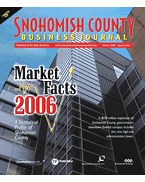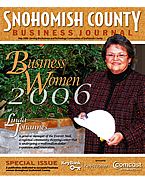 |
|
|
YOUR
COUNTY.
|
YOUR
BUSINESS JOURNAL.
|
Published February 2006
’Tis
season
for cross-country skiing
By
Kimberly Hilden
SCBJ Assistant Editor
|
Cross-country skiing — a primer Cross-country, or Nordic, skiing is believed to be the oldest form of skiing and was used as a means of transportation in the Scandinavian region. There are two basic types of Nordic skiing: The classic cross-country ski technique calls on skiers to use a stride in which both skis stay parallel to each other, with the power of the stride propelling the skier forward. The newer skating technique uses motions similar to ice skating. Unlike the classic technique, skiers using the “skating” technique do not keep their skis within narrow tracks, instead pushing off alternately with each leg to surge forward and propel their bodies. Cross-country skiing requires three basic pieces of equipment: skis, poles and boots. Skis should be selected based on the site — track, off track or back country — and the technique — lightweight for classical, shorter for skating. Poles also should suit the technique, with longer poles used for skating than for classical. Boots should be sturdier if going back-country skiing. —
The President’s Council on Physical Fitness Where to ski Stevens Pass The Stevens Pass Nordic Center is located five miles east of the Stevens Pass Summit, which is 65 miles east of Everett on Highway 2. The center’s trail system includes 28 kilometers of groomed trails. Hours of operation are 9 a.m. to 4 p.m. Thursdays, Fridays, Saturdays, Sundays and holiday periods through the ski season. Trail pass rates are sold on a daily as well as seasonlong basis. Daily rates range in price from $5 plus tax for young children to $14.50 plus tax for adults, with reduced fees for seniors. The Stevens Pass Nordic Center rents cross-country ski equipment on a daily or seasonlong basis, including packages of skis, boots and poles for adults, youths and “tots” as well as a child sled, or pulk, that can be used by an adult to safely ski while pulling a child along. For more information, call 206-812-4510 or go online to www.stevenspass.com. The Summit at Snoqualmie The Summit at Snoqualmie is located about 45 miles east of Seattle off Interstate 90. Hours of operation are 9 a.m. to 4:30 p.m. Friday, Saturday and Sunday. Trail pass rates are sold on a full-day, half-day and seasonlong basis. Half-day rates, sold after 1 p.m., are $10 plus tax. Friday full-day rates also are $10 plus tax. Weekend or holiday full-day rates are $12 plus tax for seniors 62 and older and youths age 7 to 12, and $14 plus tax for skiers age 13 to 61. Rentals also are available, with half-day ski packages of skis, boots and poles costing $12 plus tax for youths and seniors, and $14 plus tax for skiers age 13 to 61. All-day packages cost $17 plus tax for youths and seniors, and $20 plus tax for skiers age 13 to 61. For more information, call 425-434-7669 or go online to www.summit-at-snoqualmie.com. Salmon Ridge in Whatcom County The Mt. Baker Ski Area in Whatcom County offers cross-country ski rentals out of its White Salmon and Heather Meadows lodges, but does not maintain a cross-country trail system. The Nooksack Nordic Ski Club does, however, maintain about 29 kilometers in the Salmon Ridge area nearby. It is free to ski at Salmon Ridge, but a SnoPark permit is required to park at the lower trailhead area. For more information on rentals, call the Mt. Baker Ski Area at 360-734-6771. For more information on the Salmon Ridge ski conditions or on the Nooksack Nordic Ski Club, go online to www.nooksacknordicskiclub.org.
|
For much of the Puget Sound region, this winter has been one long rain shower, with the gray and soggy conditions more conducive to movie watching or book reading than communing with nature.
But just a few thousand feet above sea level, folks of all ages have been doing just that as they strap on their skis and take to the cross-country trails amongst the Cascades, enjoying the scenery of a snowy winter wonderland while burning off some calories to boot.
“The snow has been fantastic. ... It blows last year so far out of the water you need a parachute to land,” said Chris Rudolph, marketing manager for Stevens Pass.
The ski operation, located 65 miles east of Everett along Highway 2, has 28 kilometers of groomed trails for cross-country skiing along the base of Jim Hill mountain, and as of mid-January was reporting a 53-inch snow base for its trail system.
The Summit at Snoqualmie also has been transformed into a winter wonderland, said Jon Pretty, public relations manager for the ski resort, located about 45 miles east of Seattle off Interstate 90.
With a bottom base depth of 80 inches and a top base depth of more than 100 inches, it’s a very different story from last year, when low snowfalls forced the resort to close early.
“Snow-pack results for this year are 105 inches as of December 1, 2005. At December 1, 2004, we had received 19 inches,” Pretty said.
For cross-country skiers, The Summit at Snoqualmie offers more than 50 kilometers of groomed trails, with a warming yurt and two warming huts placed strategically along the trail system.
“Both of the warming huts utilize trails that pass lakes and give sweeping views of the valley below and surrounding peaks,” Pretty said of the scenic views. “We also have a few overlooks on the trail system that deliver good shots of the Cascade Range on clearer days.”
Besides providing an opportunity to enjoy views of mountains and valleys, cross-country skiing, also known as Nordic skiing, is a good form of exercise.
According to the Cross Country Ski Areas Association, cross-country skiing burns more calories per hour than any other sport, at an average of 650. It also works a number of muscle groups simultaneously, while the soft snow lessens the impact on joints.
Cross-country skiing also allows its participants to set their own pace, be it leisurely or vigorous, enabling groups of all ages to enjoy the outing together.
The Nooksack Nordic Ski Club, for example, attracts a broad range of ages and abilities, said Gail Garman, past president of the club, which maintains cross-country ski trails in the Salmon Ridge, Anderson Creek Road and White Salmon areas adjacent to Mount Baker Highway in Whatcom County.
“We have skiers of all ages and all levels of ability. Families bring their youngsters along and get them started in cross-country skiing. We have families, singles and quite a few older members, too,” she said, noting that the club hosts ski trips across the western United States and into Canada.













